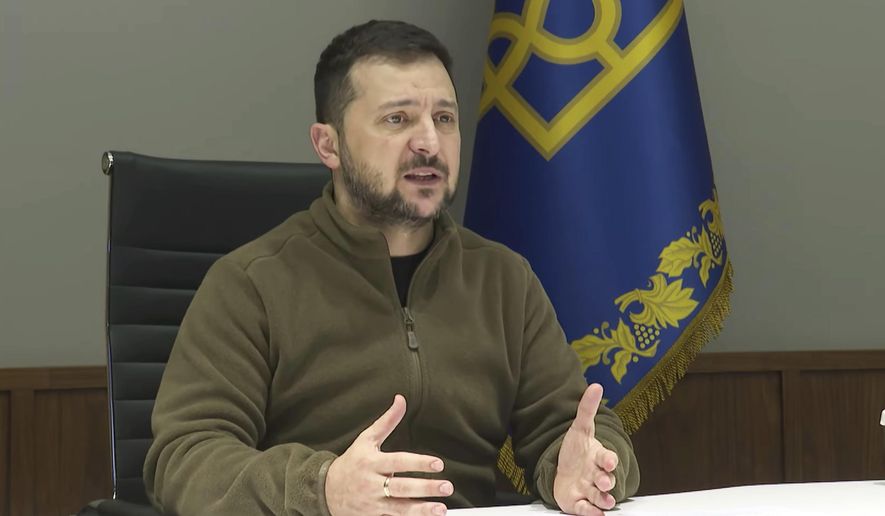Ukrainian President Volodymyr Zelenskyy pleaded with the West to provide an “air shield” over his country after another wave of unrelenting Russian attacks killed at least 19 people Tuesday, while the U.S. and its allies warned Moscow that further escalation would be met with “severe consequences.”
On Tuesday morning, Mr. Zelenskyy addressed a virtual gathering of the Group of Seven leading industrial nations, comprising the U.S., Canada, France, Germany, Italy, Japan and Britain. It was a tense moment, with fears that Russia’s ramped-up air assault could be a precursor to further escalation, perhaps even the use of biological, chemical or nuclear weapons.
Russian drone and missile strikes over the past several days have targeted Ukrainian infrastructure, including in Kyiv. The Ukrainian capital had relative peace in recent months while most of the fighting was concentrated in the eastern Donbas region.
Russian President Vladimir Putin ordered the strikes — the heaviest since the early days of the war in February — after a weekend explosion damaged the sole bridge linking Russia with the Crimean Peninsula. Moscow, which forcibly annexed Crimea from Ukraine in 2014, blamed Kyiv for the blast.
The U.S. and its Western allies have provided Ukraine with a host of defense systems and other military equipment since the start of the war, but Mr. Zelenskyy said the latest attacks demonstrate a need for more. He specifically called for sophisticated defense systems capable of repelling Russian air assaults.
“I am asking you to strengthen the overall effort to help financially with the creation of an air shield for Ukraine. Millions of people will be grateful to the Group of Seven for such assistance,” he said in a virtual address, according to English media translations of his remarks.
“When Ukraine receives a sufficient quantity of modern and effective air defense systems, the key element of Russia’s terror, rocket strikes, will cease to work,” Mr. Zelenskyy said.
Ukrainian officials said the latest Russian assault targeted civilian areas and energy infrastructure. In the city of Zaporizhzhia, residential buildings, a school and medical facilities were hit Monday, officials said. They called on Ukrainians to stock up on water because of widespread power outages after the Russian attacks.
More than 300 cities and towns stretching from Kyiv to Lviv, near the western border with Poland, lost power, Ukrainian officials said.
In a statement after Mr. Zelenskyy’s address, the G-7 leaders condemned the strikes.
“Our meeting took place against the backdrop of the most recent missile attacks against civilian infrastructure and cities across Ukraine, leading to the death of innocent civilians. We condemn these attacks in the strongest possible terms and recall that indiscriminate attacks on innocent civilian populations constitute a war crime. We will hold President Putin and those responsible to account,” the group of leaders said.
The seven-nation bloc also warned Mr. Putin against further escalation in Ukraine. They emphasized that the Kremlin may turn to even deadlier weapons as it faces more setbacks in its ground war.
SEE ALSO: EXCLUSIVE: DHS seeks volunteers to process Ukrainians; critics fear ‘rubber stamp’
“We deplore deliberate Russian escalatory steps, including the partial mobilization of reservists and irresponsible nuclear rhetoric, which is putting global peace and security at risk. We reaffirm that any use of chemical, biological or nuclear weapons by Russia would be met with severe consequences,” the G-7 said.
The G-7 statement also condemned Belarus, which has allowed Russian forces to use its territory to launch attacks across the border into Ukraine. Belarus on Tuesday also announced the formation of a joint force with Russia, which the G-7 condemned as further evidence of Minsk’s “complicity” with the Russian invasion.
At a United Nations briefing in Geneva, officials said the Russian attacks — particularly those targeting Ukrainian power plants — could be considered war crimes.
“Damage to key power stations and lines ahead of the upcoming winter raises further concerns for the protection of civilians and in particular the impact on vulnerable populations,” Ravina Shamdasani, the U.N. high commissioner for human rights, told reporters. “Attacks targeting civilians and objects indispensable to the survival of civilians are prohibited under international humanitarian law.”
Russian officials have defended the strikes on Ukraine, but Foreign Minister Sergey Lavrov downplayed the prospect of a tactical nuclear strike. He said Tuesday that such escalation would happen only if Russia feels it is under imminent attack.
The country’s nuclear doctrine, he said, calls for “exclusively retaliatory measures intended to prevent the destruction of the Russian Federation as a result of direct nuclear strikes or the use of other weapons that raise the threat for the very existence of the Russian state,” he said.
Fear about Russian nuclear strikes reached new heights last week after President Biden spoke of the “prospect of Armageddon” in remarks at a Democratic Party fundraiser. White House and Pentagon officials have tried to head off any panic by saying they had seen no indication that Mr. Putin was prepared to use nuclear weapons.
• This article is based in part on wire service reports.
• Ben Wolfgang can be reached at bwolfgang@washingtontimes.com.




Please read our comment policy before commenting.